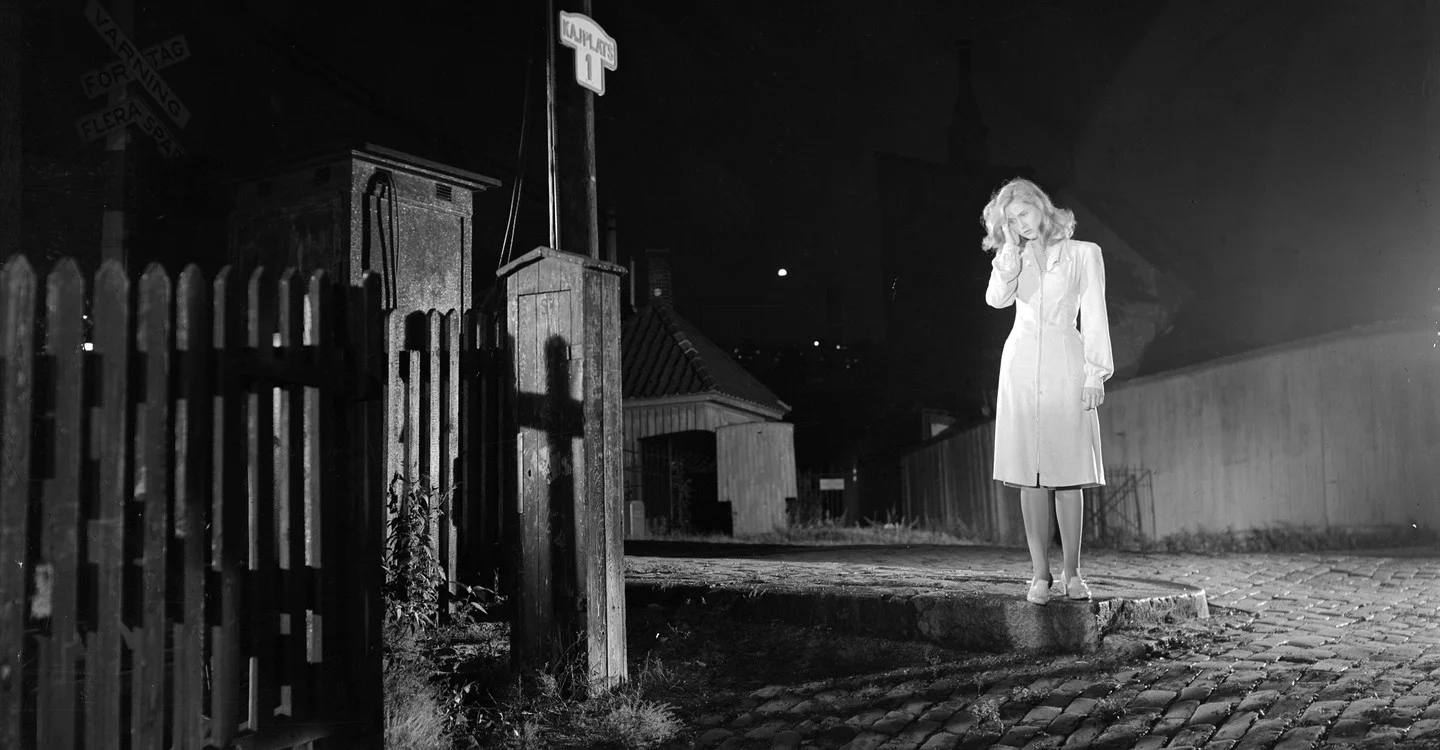crisis (1946)
Bergman’s directorial debut deals with empty souls and hungry eyes, it deals with completing our life by borrowing the beauty of another, bringing their life force into ours for our continued happiness. Value in all its forms is explored, with Bergman’s characters borrowing money to buy gifts of persuasion, to find value in keeping another with them, or value in the pace of life’s good times. In so many ways, we see the empty, yet seductive, life in the big city full of hustlers and big spenders looking for a thrill. Bergman displays an effortless hand in his first foray, bringing the human drama into the fold of a light play, a comedy made up of pieces of drama as he states in the opening narration, beckoning us to look at the simple trappings as the grand stage of the theater, a window shade is a velvet curtain. The emotions that are touched on can barely fit into the runtime, but Bergman attempts to balance the various plot threads and succeeds most of the time. What strikes most are his passages of dream-filled dialogue that takes us out of the frame and far away from the screen, though his characters are stuck in it (he’ll solve this in later decades), the liar character has the most poetic moments of moonlit life and its moonlit sorrows. Much is made of this dichotomy and we see the crisis of day and night just as simply as the crisis of the soul that Bergman portrays. The crisis at the heart of the film is simple, and it deals with the reconciliation of our desires and where they come from; are they selfless or selfish? And do we really care which?
Each of our players wishes to possess the life essence of the young Nelly in some way for their own benefit, or so we think. Bergman wisely leaves this ambiguous and uses it as the primary inner conflict of Ingeborg. Some of the film’s best sequences result from her questioning her own motivations as she reaches out to get Nelly back. This, of course leads to another of Bergman’s spiraling complexities throughout the drama, as the people of the small town, ready to believe what they are told, are shown to be easy prey for the world-weary visitors from the city. It doesn’t take much for Jack to lie his way into manipulating Nelly, and the call of the modern world is seductive as Jack single-handedly draws the youth away from a charity ball to drink and play jazz. The weakness of small town life is touched on when this simple act causes a mark of shame on Nelly with rumors spreading quickly through the grapevine. The crisis here, then, is an identity crisis that all in Europe likely felt around this time; is it comedy or tragedy? is life marching forward into the unknown future or are we meant to regress to our small lives of frugal minimalism? The life of extravagance calls to Nelly and Ingeborg’s immediate emotion is to feel inadequate. The film’s best observations come from its final act, as Jack is outed for a snake manipulating Nelly with lies in the same way her mother manipulates with material; this new world of cold and calculating selfishness is rejected by all as Jenny confronts the mirror and the woman within, Jack confronts his own emptiness and takes his life, Nelly confronts the life she is walking into and returns to the womb of her upbringing. The film’s only meandering takes place just at its conclusion, rather than leave us at peak action with Jack’s suicide, we return to the small town and meet with each of its characters one last time, which, rather than serve to clarify or enhance the film’s power, seems to be an attempt at wrapping up loose ends that don’t need wrapping up.
The mid-twentieth century’s identity crisis as played out as a crisis of identity and motivation in the lives of these small players is a great debut for a filmmaker who would later enhance all of the seeds planted in Crisis. Each of our characters faces a moment of horror and transgression when forced to come face to face with their own self, it is at a moment when they see within their own depths and most do not like what they find underneath. This was the spirit of the times, of course, as humanity came to know its own destructive potential in a way unrealized, and on such mass scale, prior. The only character who contains any innocence, since she was too young during the war to have any influence on it, is Nelly, whose transgression comes at the realization of the guilt and depravity within all those around her, depths she never suspected her these pillars of trust in her life could have. The dramatic weight is counterbalanced perfectly by Bergman’s comic levity and framing the film as a dramatic play unto itself, the heavy score and the music from the neighboring theater accenting and punctuating his penultimate sequence only further the self-awareness of the play at hand, though we see crisis in our own eyes when looking in the mirror, our omniscient narrator keeps the audience as observers of these beings. Crisis is a birthing moment for Ingmar Bergman and a strong debut.
7

